Table of Contents
PENGUIN BOOKS
THE PENGUIN GUIDE TO THE UNITED STATES CONSTITUTION
RICHARD BEEMAN, currently a professor of history at the University of Pennsylvania, has previously served as the chair of the Department of History, associate dean in Penns School of Arts and Sciences, and dean of the College of Arts and Sciences. He serves as a trustee of the National Constitution Center and is chair of the Constitution Centers Committee on Programs, Exhibits, and Education. Author of six previous books, Professor Beeman has received numerous grants and awards, including fellowships from the National Endowment for the Humanities, the Rockefeller Foundation, the Institute for Advanced Study at Princeton, and the Huntington Library. His biography of Patrick Henry was a finalist for the National Book Award. He is, most recently, the author of Plain, Honest Men: The Making of the American Constitution.
A NOTE ON THE TEXT
THE TEXTS IN THIS EDITION ARE BASED on the transcriptions of the Declaration of Independence and the U.S. Constitution in the National Archives and Records Administration and on Jacob E. Cookes edition of The Federalist Papers. In some cases the punctuation in the documents reprinted in this edition has been altered for purposes of consistency and clarity; the eighteenth-century spelling in the original documents has been retained. Following the practice in Jacob E. Cookes The Federalist, the Penguin edition omits the original titles in each of the three essays reproduced from The Federalist Papers.
THE DECLARATION OF INDEPENDENCE
WHEN IN THE COURSE OF HUMAN EVENTS, it becomes necessary for one people to dissolve the political bands which have connected them with another, and to assume among the powers of the earth, the separate and equal station to which the Laws of Nature and of Natures God entitle them, a decent respect to the opinions of mankind requires that they should declare the causes which impel them to the separation.

This single opening sentence of the preamble to the Declaration of Independence displays brilliantly the ability of the documents principal author, Thomas Jefferson, to convey a wealth of meaning in just a few elegant words. It announces the Americans intention of declaring their independence, of dissolving the political bands that had connected them to England. The justification for this extraordinary act was to be found in the Laws of Nature and of Natures God. Jefferson, a deist who did not believe that God played an active hand in the affairs of mankind, nevertheless did believe that certain natural laws were God-given. This first sentence also signals Jeffersons awareness that a compelling public statement of the reasons for the decision to seek independence from England was necessary if Americas political leaders were going to earn the support not only of the people of their own colonies but, equally important, of foreign nations like France, whose support for the American military effort against England was considered crucial. Before declaring those causes which impel them to separation, however, Jefferson lays out the general philosophy on which Americas quest for independence was founded.
We hold these truths to be self-evident, that all men are created equal, that they are endowed by their Creator with certain unalienable Rights, that among these are Life, Liberty and the pursuit of Happiness.That to secure these rights Governments are instituted among Men, deriving their just powers from the consent of the governed.That whenever any Form of Government becomes destructive of these ends, it is the Right of the People to alter or to abolish it, and to institute new Government, laying its foundation on such principles and organizing its powers in such form, as to them shall seem most likely to effect their Safety and Happiness.

The ideas embodied in the powerful opening lines of the second paragraph of the Declaration were not Jeffersons alone. The late seventeenth-century English political philosopher John Locke had written in his
Second Treatise of Civil Government that life, liberty, and estate were among the natural rights of mankind; they were rights that existed even before governments were created, at a time when mankind was living in a state of nature. Jeffersons fellow Virginian George Mason, again following Locke, had included in the preamble of the Virginia Declaration of Rights, penned just a few weeks before Jefferson wrote the Declaration of Independence, That all men are by nature equally free and independent and have certain inherent rights, which he described as the enjoyment of life and liberty, with the means of acquiring and possessing property, and pursuing and obtaining happiness and safety. But Jeffersons language has more forceful simplicity. The assertion that all men are created equal was in 1776 more an as-yet-unfulfilled promise than a statement of political fact, but it has helped to define some of the highest aspirations of the American nation throughout its history.
The opening lines of the second paragraph were, in fact, merely a preface to the real punch line of that paragraph: the assertion of the right to rebel against the government of England. Jefferson reminds his audience that the very purpose of government is to protect the natural rights of mankind. Since governments, at the time of their creation, base their authority on the consent of the people whom they are governing, then it is also the right of the people to alter or to abolish that government if its actions threaten the very liberties it was created to protect. Realizing the dangers of living in a society without government, Jefferson was quick to add that once the people had severed their connection with their government, they must move to form new governments whose principles and powers would be supportive of the peoples Safety and Happiness.
Prudence, indeed, will dictate, that Governments long established should not be changed for light and transient causes; and accordingly all experience hath shewn, that mankind are more disposed to suffer, while evils are suffer-able, than to right themselves by abolishing the forms to which they are accustomed. But when a long train of abuses and usurpations pursuing invariably the same Object evinces a design to reduce them under absolute Despotism, it is their right, it is their duty, to throw off such Government, and to provide new Guards for their future security.Such has been the patient sufferance of these Colonies; and such is now the necessity which constrains them to alter their former Systems of Government. The history of the present King of Great Britain is a history of repeated injuries and usurpations, all having in direct object the establishment of an absolute Tyranny over these States. To prove this, let Facts be submitted to a candid world.

The men representing their colonies in the Second Continental Congress had reached the decision to declare independence reluctantly, even painfully. They had a deep reverence for English common law and indeed for the body of law and custom that they called the English constitution. And nearly up to the moment of independence, many of those leaders expressed great affection for the institution of the monarchy. For all those reasons, the men who endorsed the Declaration of Independence wished to emphasize that their decision was not one arrived at rashlythat they had done everything within their power to find some alternative to the decision to revolt against the authority of the Crown, and that only the long train of abuses and the repeated injuries and usurpations committed by King George III had driven them to this final, decisive action.


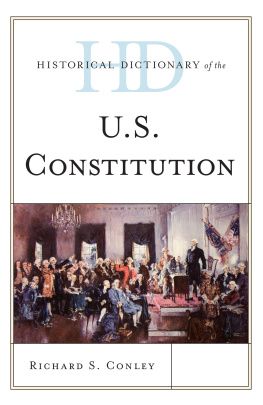
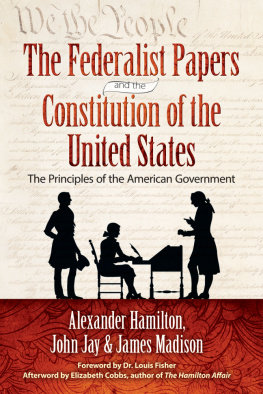
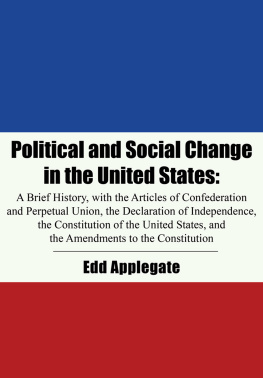
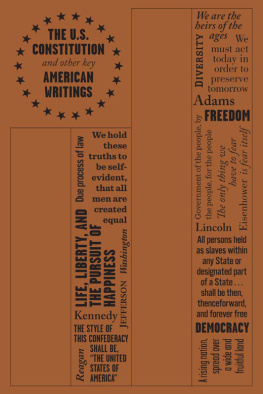
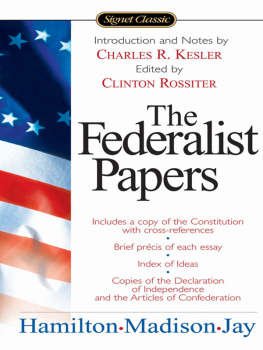
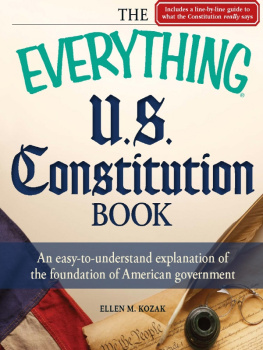
![Jay John - The Federalist : a collection of essays, written in favour of the new Constitution, as agreed upon by the Federal Convention, September 17, 1787. : In two volumes. Vol. I[-II.]](/uploads/posts/book/76130/thumbs/jay-john-the-federalist-a-collection-of-essays.jpg)
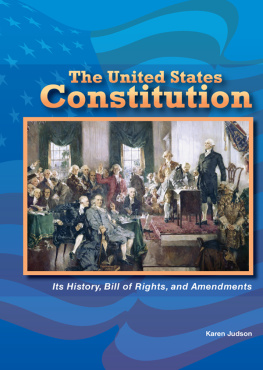

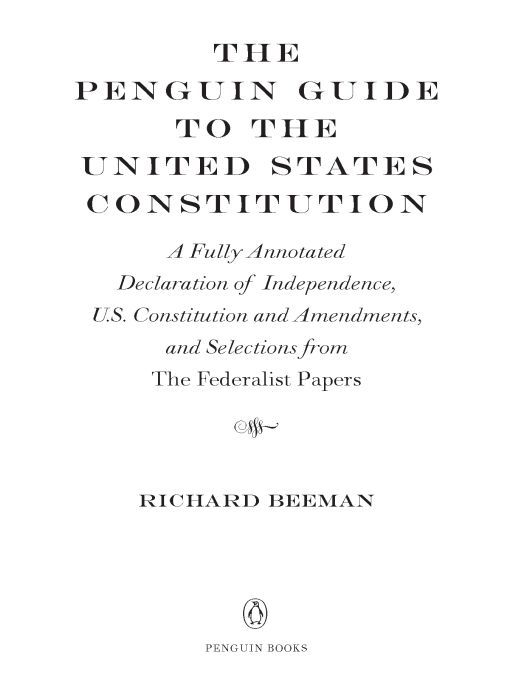
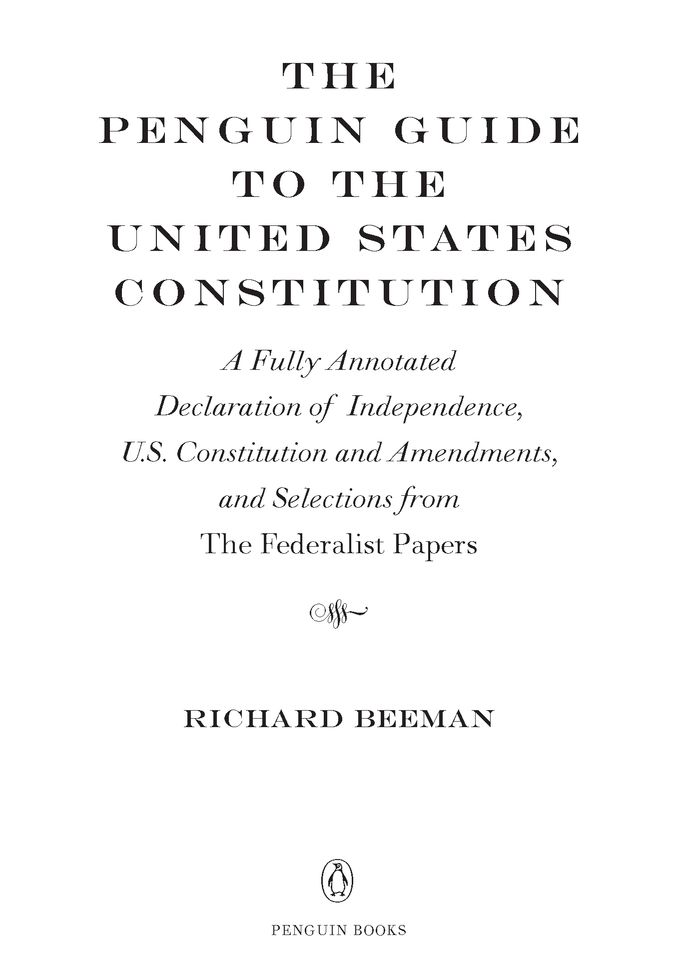
 This single opening sentence of the preamble to the Declaration of Independence displays brilliantly the ability of the documents principal author, Thomas Jefferson, to convey a wealth of meaning in just a few elegant words. It announces the Americans intention of declaring their independence, of dissolving the political bands that had connected them to England. The justification for this extraordinary act was to be found in the Laws of Nature and of Natures God. Jefferson, a deist who did not believe that God played an active hand in the affairs of mankind, nevertheless did believe that certain natural laws were God-given. This first sentence also signals Jeffersons awareness that a compelling public statement of the reasons for the decision to seek independence from England was necessary if Americas political leaders were going to earn the support not only of the people of their own colonies but, equally important, of foreign nations like France, whose support for the American military effort against England was considered crucial. Before declaring those causes which impel them to separation, however, Jefferson lays out the general philosophy on which Americas quest for independence was founded.
This single opening sentence of the preamble to the Declaration of Independence displays brilliantly the ability of the documents principal author, Thomas Jefferson, to convey a wealth of meaning in just a few elegant words. It announces the Americans intention of declaring their independence, of dissolving the political bands that had connected them to England. The justification for this extraordinary act was to be found in the Laws of Nature and of Natures God. Jefferson, a deist who did not believe that God played an active hand in the affairs of mankind, nevertheless did believe that certain natural laws were God-given. This first sentence also signals Jeffersons awareness that a compelling public statement of the reasons for the decision to seek independence from England was necessary if Americas political leaders were going to earn the support not only of the people of their own colonies but, equally important, of foreign nations like France, whose support for the American military effort against England was considered crucial. Before declaring those causes which impel them to separation, however, Jefferson lays out the general philosophy on which Americas quest for independence was founded. The ideas embodied in the powerful opening lines of the second paragraph of the Declaration were not Jeffersons alone. The late seventeenth-century English political philosopher John Locke had written in his Second Treatise of Civil Government that life, liberty, and estate were among the natural rights of mankind; they were rights that existed even before governments were created, at a time when mankind was living in a state of nature. Jeffersons fellow Virginian George Mason, again following Locke, had included in the preamble of the Virginia Declaration of Rights, penned just a few weeks before Jefferson wrote the Declaration of Independence, That all men are by nature equally free and independent and have certain inherent rights, which he described as the enjoyment of life and liberty, with the means of acquiring and possessing property, and pursuing and obtaining happiness and safety. But Jeffersons language has more forceful simplicity. The assertion that all men are created equal was in 1776 more an as-yet-unfulfilled promise than a statement of political fact, but it has helped to define some of the highest aspirations of the American nation throughout its history.
The ideas embodied in the powerful opening lines of the second paragraph of the Declaration were not Jeffersons alone. The late seventeenth-century English political philosopher John Locke had written in his Second Treatise of Civil Government that life, liberty, and estate were among the natural rights of mankind; they were rights that existed even before governments were created, at a time when mankind was living in a state of nature. Jeffersons fellow Virginian George Mason, again following Locke, had included in the preamble of the Virginia Declaration of Rights, penned just a few weeks before Jefferson wrote the Declaration of Independence, That all men are by nature equally free and independent and have certain inherent rights, which he described as the enjoyment of life and liberty, with the means of acquiring and possessing property, and pursuing and obtaining happiness and safety. But Jeffersons language has more forceful simplicity. The assertion that all men are created equal was in 1776 more an as-yet-unfulfilled promise than a statement of political fact, but it has helped to define some of the highest aspirations of the American nation throughout its history. The men representing their colonies in the Second Continental Congress had reached the decision to declare independence reluctantly, even painfully. They had a deep reverence for English common law and indeed for the body of law and custom that they called the English constitution. And nearly up to the moment of independence, many of those leaders expressed great affection for the institution of the monarchy. For all those reasons, the men who endorsed the Declaration of Independence wished to emphasize that their decision was not one arrived at rashlythat they had done everything within their power to find some alternative to the decision to revolt against the authority of the Crown, and that only the long train of abuses and the repeated injuries and usurpations committed by King George III had driven them to this final, decisive action.
The men representing their colonies in the Second Continental Congress had reached the decision to declare independence reluctantly, even painfully. They had a deep reverence for English common law and indeed for the body of law and custom that they called the English constitution. And nearly up to the moment of independence, many of those leaders expressed great affection for the institution of the monarchy. For all those reasons, the men who endorsed the Declaration of Independence wished to emphasize that their decision was not one arrived at rashlythat they had done everything within their power to find some alternative to the decision to revolt against the authority of the Crown, and that only the long train of abuses and the repeated injuries and usurpations committed by King George III had driven them to this final, decisive action.